七年级英语下第三单元知识重点和练习
外研版七年级下册英语Module-3Making-plans知识点及练习(有答案)
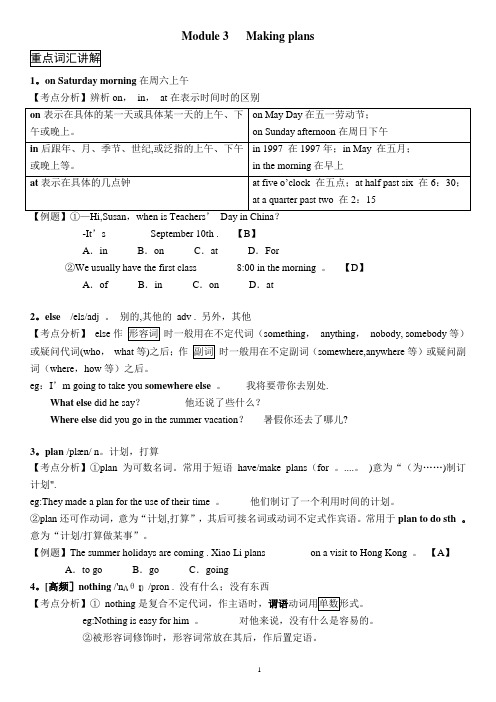
Module 3 Making plans1。
on Saturday morning 在周六上午【考点分析】辨析on , in , at 在表示时间时的区别-It ’s ________ September 10th . 【B 】A .inB .onC .atD .For②We usually have the first class________8:00 in the morning 。
【D 】A .ofB .inC .onD .at2。
else /els/adj 。
别的,其他的 adv . 另外,其他【考点分析】 else 作 时一般用在不定代词(something , anything , nobody, somebody 等)或疑问代词(who , what 等)之后;作 时一般用在不定副词(somewhere,anywhere 等)或疑问副词(where ,how 等)之后。
eg :I ’m going to take you somewhere else 。
我将要带你去别处.What else did he say ? 他还说了些什么?Where else did you go in the summer vacation ? 暑假你还去了哪儿?3。
plan /plæn/ n 。
计划,打算【考点分析】①plan 为可数名词。
常用于短语 have/make plans (for 。
....。
)意为“(为……)制订计划".eg:They made a plan for the use of their time 。
他们制订了一个利用时间的计划。
②plan 还可作动词,意为“计划,打算”,其后可接名词或动词不定式作宾语。
常用于plan to do sth 。
意为“计划/打算做某事”。
【例题】The summer holidays are coming . Xiao Li plans ________ on a visit to Hong Kong 。
七年级英语下第三单元知识重点和练习

Unit 3 Why do you like koala bears?一、词组1.want to do sth .想要做某事2。
want sb to do sth 想要某人做某事4.Let sb do sth 让某人做某事5。
kind of 稍微,有一点6.a kind of 一种…7。
…years old …年龄如:ten years old 十岁8. like doing sth喜欢做某事9.play with …与。
.。
一起玩10.be quiet 安静11.during the day 在白天12。
at night 在夜间13。
have a look at.. 看..。
14。
one…the other 一个。
.。
另一个..。
15。
eat grass 吃草16。
eat leaves 吃树叶17.very shy/ smart/ cute 非常害羞,聪明,可爱18。
South Africa南非19。
other animals其他动物二、日常交际用语(1)-Let's see the lions frist.咱们先看看狮子吧。
(Let's do…first。
咱们先做…….其中Let’s是let us 的缩写形式,意思是“让我们、咱们……",一般用来提出建议,后接动词原形.其中first是副词,意为“首先”表示顺序,其位置可置于句尾,也可置于句首.)Eg:-Let us play games,shall we?–Great!(2)—Do you like giraffes?你喜欢长颈鹿吗?Yes,I do.是的,我喜欢。
/ No,I don’t.不,我不喜欢。
(Do you like+n.?你喜欢……吗?其中名词可为不可数,也可为可数,当是可数名词时要用它的复数形式。
)(3)—Why do you want to see the lions?你为什么想去看狮子呢?-Becase they are very cute.因为他们逗人喜爱.—Why do you like pandas?你为什么喜欢……?—Because they’re very cure.Why是疑问副词,意思是“为什么”。
Unit 3 单元考点与练习人教版英语七年级下册

Unit 3考点一、交通方式的表达① take a/ the +交通工具(to 某地),乘坐某种交通工具(去某地),ride a bike 固定搭配,不能用take② go to 某地+ by 某种交通方式③走路去某地:walk to 某地;go to某地on foot ( )1.—Does your mother go to work by bike every day?—No. She sometimes takes ________ bus.A.a B.an C./ D.some( )2.More and more people in Qingdao go to work ________ subway now.A.with B.on C.in D.by( )3.—How long does it take us to go to your hometown from here?—It takes us ________ hour to go to my hometown by ________ train.A.an;a B.an;/ C.an;the( )4.—Do you get to school by ________ bus?—No,I don't. I take ________ subway.A.a;a B.a;the C.the;the D./;the( )5.—Is this your bike?Can I ________ it? —Sure.A.ride B.look C.take D.eat( )6 .—________ does Alan go home? —He takes the bus.A.Where B.What C.How D.Why( )7 .My uncle usually ___ to Kunming from Qujing. Sometimes he goes there ____.A.takes the plane;by train B.takes the plane;by the trainC.take the plane;by trains D.take the plane;by train( )8.—________ do you usually come to school? —________ foot.A.How;By B.How;On C.What;By D.What;On9.Let's walk to school.(改为同义句) Let's go to school .10.Mrs. King goes to work by subway every day.(改为同义句)Mrs. King to work every day.考点二、_复合形容词的用法:数词-名词单数-形容词,如五岁的:five-year-old, 五米长的:five-meter-long, 这些形容词后面都有修饰的名词。
七年级英语下册u3howdoyougettoschool重点知识讲解与测试人教新目标版
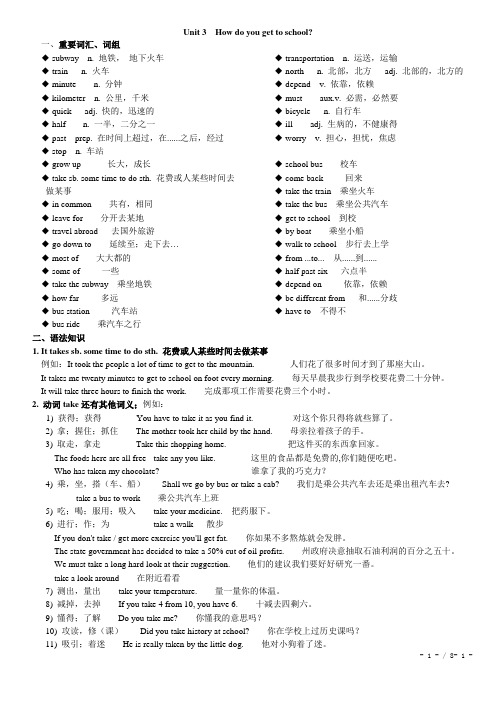
Unit 3 How do you get to school?一、重要词汇、词组◆ subway n. 地铁,地下火车◆ train n. 火车◆ minute n. 分钟◆ kilometer n. 公里,千米◆ quick adj. 快的,迅速的◆ half n. 一半,二分之一◆ past prep. 在时间上超过,在......之后,经过◆ stop n. 车站◆ transportation n. 运送,运输◆ north n. 北部,北方adj. 北部的,北方的◆ depend v. 依靠,依赖◆ must aux.v. 必需,必然要◆ bicycle n. 自行车◆ ill adj. 生病的,不健康得◆ worry v. 担心,担忧,焦虑◆ grow up长大,成长◆ take sb. some time to do sth. 花费或人某些时间去做某事◆ in common 共有,相同◆ leave for 分开去某地◆ travel abroad 去国外旅游◆ go down to延续至;走下去…◆ most of大大都的◆ some of一些◆ take the subway乘坐地铁◆ how far多远◆ bus station汽车站◆ bus ride乘汽车之行◆ school bus校车◆ come back回来◆ take the train乘坐火车◆ take the bus乘坐公共汽车◆ get to school到校◆ by boat乘坐小船◆ walk to school步行去上学◆ from ...to...从......到......◆ half past six六点半◆ depend on依靠,依赖◆ be different from和......分歧◆ have to不得不二、语法知识1. It takes sb. some time to do sth. 花费或人某些时间去做某事例如:It took the people a lot of time to get to the mountain.人们花了很多时间才到了那座大山。
人教版七年级下册英语3单元知识点总结与练习题

一、词汇拓展(1)diver开车;驾驶→drivern司机;驾驶员(2)ride.骑,乘坐→ridern骑车或马的人(3)villagen.乡村;村镇→villagern.村民(5)quickadj.快的;迅速的→quicklyadv.快地;迅速地(6)cross.越过;横过acrosspron.横过;横穿crossingn十.字路口(7)trueadj.真实的→trulyadv.真实地二、短语(1)busstop公共汽车停车站(2)busstation公共汽车站(3)schoolday学校上课日;学校上班日(4)an11-year-oldboy一个十一岁大的孩子(5)getto到达同reach或arriveat/in (6)takeabus乘坐公共汽车(7)walktoschool步行去上学同gotoschoolonfoot(8)drivetowork开车去上班(9)takethesubway乘地铁(10)rideabike骑自行车(11)crossariveronaropeway(12)haveto不得不;必须同must(13)cometrue变为现实;实现(14)thinkof想起;认为同comeupwith(15)talktosb.跟某人谈话同speaktosh(16)between....and...介于⋯⋯.和⋯⋯之间、(17)bybus/subway乘坐公共汽车/地铁:(18)ontheschoolbus乘坐校车(19)inaplane乘坐飞机同byplane3(20)howlong多久;多长时间(21)howfar多远(22)from.....to从.⋯到...⋯.(23)whatabout...?.⋯⋯怎么样?.⋯呢.?(24)You,too.你也一样。
(25)I’mnotsure我.不确定三、知识点stop1)stop作动词,意为“停止,中断,阻止,阻拦”等意。
例如:Thecarstopped.车停了。
新目标英语七年级(下)Unit_3知识要点归纳

知【重点词汇】train火车subway 地铁ride 骑旅程minute 分钟far &远;远的kilometer千米;公里new 新的;刚出现的drive 开车live 生活;居住stop 车站停止cross 横过;越过afraid 害怕的;畏惧的leave 离开dream 梦想;睡梦true 真的;符合事实的bridge 桥take the subway 乘地铁ride a bike 骑自行车how far 多远how long 多长时间walk to school 步行去上学get to school 到校by bus 乘公汽by bike 骑自行车by train 乘坐火车by boat 乘坐小船cross the river 过河come true 实现;成为现实【重难点句子】1.It takes sb.some time to do sth.花费某人一段时间去做某事例如:It takes me twenty minutes to get to school on foot every morning.我每天早上花20分钟步行到学校。
☆take 还有“乘;坐”之意例如:Shall we go by bus or take a cab?我们是乘公共汽车去还是乘出租去?2.The bus ride is never boring because I always talk to my classmates.坐公交车从不会无聊,因为我总是跟同学们聊天。
在这句话中ride 是名词,表示“行程”。
How 引导的特殊疑问句3.用How do you...?询问别人做某事的方式。
回答可以用by sth.或take sth.的结构。
4.How far 引导的特殊疑问句用来询问两地之间的距离。
34Copyright ©博看网. All Rights Reserved.。
Unit 3 单元知识点课件2022-2023学年人教版七年级英语下册
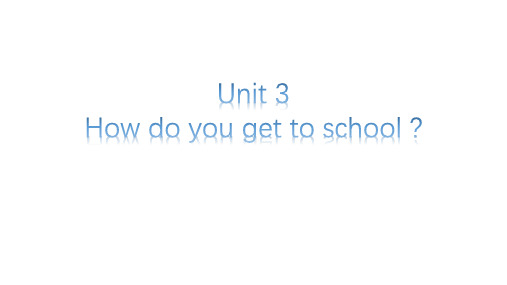
一、根据句意,用恰当的疑问词(组)完成下列小对话。
1.—__H__o_w__l_o_n_g__does it take you to get to your uncle's home?
—About twelve minutes.
2.—__H__o_w__f_a_r__is it from your home to the store?
—He is 16.
It is + adj. (for sb.) to do sth. (对某人来说)干某事是…… 例如:
It is interesting for me to play computer games. 对我来说玩电脑游戏很有趣。
— It’s very important __B_ us to make a plan before a
--- ______ do you play football? --- Once a week.
A. How much B. How long C. How often D. How far
答案:C 解析:本题是对疑问副词词组的考察,通过答句可以 判断出是询问动作发生的频率,所以选择C。
—______ is it from your home to the school?
辨析 cross, across与through
(1)across 介词,与动词连用,动词+across cross=go across
(2)cross 动词,主要表示在物体表面上横穿。如横过马路、 过桥、过河等。例如: Be careful when you cross the street.
(3) through 介词,主要表示从空间内部穿过。如穿过森林、 隧洞等。例如: The two friends were walking through the forest.
牛津沪教版英语七年级下Unit 3基础知识复习及练习

七年级下U3基础知识复习及练习一.本节内容:1. 重要词汇和短语:1.the Li family 李的一家人2. design machines 设计机械3. quite a few 相当多,不少4.catch thieves 抓捕小偷5.help keep the city a safe place 保卫城市安全6.draw plans of buildings 画建筑物的平面图7.have been an engineer for several years 当工程师好几年了8.train someone in sport 在运动方面训练某人9.deliver letters 送信10.type letters and answer the phone 打字和接电话11.bring sb. sth.=bring sth. to sb. 给某人带来某物12.grow vegetables in the fields 在田野里种蔬菜13.be in charge of a school 管理一个学14.be used for doing sth. 被用来做某事15.tell the time 报时16.have a good time =enjoy oneself 玩得开心17.the top of ……的顶端2.词性转换:engine n.引擎engineer n. 工程师an engineer 一个工程师cook n. 厨师cooker n.厨具farm n. 农场farmer n.农民thief n. 小偷two thieves 两个小偷safe adj. 安全的safely adv.安全地safety n.安全save. v. 挽救、节省use v. 使用useful adj.有用的useless adj.无用的help v.帮助helpful adj.有帮助的helpless adj. 无助的fantasy n.幻想fantastic adj. 奇妙的wait v. 等待waiter n.男服务员waitress n.女服务员build v. 建筑building n.建筑物3.词汇详解1. visitn. 参观,拜访 a visit to Garden City 参观花园市这里的visit 是名词v. 参观,拜访to visit Garden City 参观花园市这里的visit 是动词They paid a visit to Shanghai Museum last week.They visited Shanghai Museum last week.2. the Li family 李家辨析:family、house和home1、family的意思是“家庭、家庭成员”,与居住的房子无关。
外研社七年级下册英语:module 3 重点知识及训练(单词短语,语法,练习)(有答案)

Module 3 重点单词和短语go over复习;练习picnic['pɪknɪk] n.野餐housework ['haʊswɜːk] n.家务劳动on prep.在……时候else[els]adv.其他; 另外nobody['nəʊbədɪ]pron.没有人at prep.在……点钟nothing['nʌθɪŋ] pron.没有什么; 没有东西silly['sɪlɪ]adj.愚蠢的; 傻气的fantastic[fæn'tæstɪk]adj.极好的forward ['fɔːwəd] adv.面向未来的; 向前look forward to盼望fan[fæn] n.迷; 支持者make friends 交朋友shirt [ʃɜːt] n.球衣; (男式)衬衫cheer[tʃɪə]v.为……喝彩player['pleɪə]n.运动员;选手hope [həʊp]v.希望win[wɪn]v. ( won ) 赢;获胜enjoy oneself过得愉快myself[maɪ'self; mɪ'self]pron.我自己during ['djʊərɪŋ]prep.在......期间May [meɪ]n. 5月May Day五一劳动节late [leɪt]adv.迟; 晚adj.迟的; 晚的walk [wɔːk] n.步行; 走take a walk散步country['kʌntrɪ]n.乡下; 乡村second ['sek(ə)nd] num.第二collect[kə'lekt]v.收集litter['lɪtə] n.垃圾fun[fʌn] n.娱乐; 乐趣summer holiday暑假camp [kæmp] n.营地;帐篷Australian [ɑ'strelɪən]adj.澳大利亚的sightseeing ['saɪtsiːɪŋ] n.观光; 游览go sightseeing观光beach [biːtʃ] n.海滨; 海滩early ['ɜːlɪ] adv.早; 提前adj.早的语法回顾1. at the weekend: 在周末on weekdays: 在平日e.g. We should study hard on weekdays and have a good rest at the weekend.2. on Saturday morning/ afternoon/ evening 在星期六的早晨/下午/晚上具体指“在某一天(或有修饰词)的上午/ 下午/ 晚上”用介词“on” 。
Unit 3重点知识点讲解梳理和练习 2020-2021学年人教版英语七年级下册

初中英语重点知识点梳理. 7.2-3重点短语get to到达everyday每天by bike骑自行车take the subway乘地铁ride a bike骑自行车how far多远how long多长时间walk to school步行去上学have a good day玩得愉快重点句型1.How do you get to school? 你是怎样到学校的?2.How far is it from your home to school? 从你家到学校有多远?3.How long does it take you to get to school? 你到学校花费多长时间?1.one hundred and five 一百零五要点精析hundred数词,意为“一百".例:What will happen in a hundred years? 一百年后将发生什么?知识拓展①当hundred前面有具体数字时,其后不加s,也不和of连用。
例:There are nine hundred students on the playground. 操场上有九百名学生。
②若表示一个不确定的数字,前面没有具体数字时,其后要加s,且与of连用,hundreds of表示“数以百计的,成百上干的".例:There are hundreds of trees on the hill. 小山上有成百上干棵树,【助记】hundred,thousand,million与bili on的用法模糊数字两有(有s有of),具体数字两无(无s无of).2.I ride it to school everyday. 我每天骑着它去学校。
要点精析every形容词,意为“每一;每个“,其后接单数可数名词.everyday意为“每天",常用作一般现在时的时间状语,例:Every student comes here.每一个学生都来这儿.They are busy everyday.他们每天都忙。
人教版七年级英语下册Unit 3知识点归纳总结和练习(含答案)
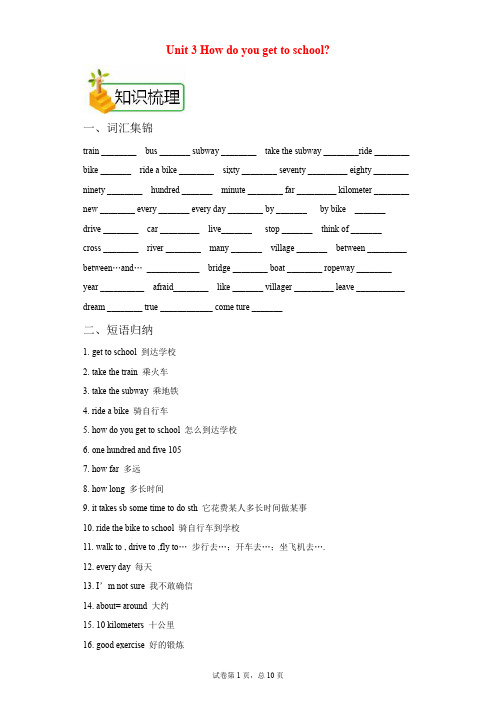
Unit 3 How do you get to school?一、词汇集锦train ________ bus _______ subway ________ take the subway ________ride ________ bike _______ ride a bike ________ sixty ________ seventy _________ eighty ________ ninety ________ hundred _______ minute ________ far _________ kilometer ________ new ________ every _______ every day ________ by _______ by bike _______ drive ________ car _________ live_______ stop _______ think of _______cross ________ river ________ many _______ village _______ between _________ between…and…____________ bridge ________ boat ________ ropeway ________ year __________ afraid________ like _______ villager _________ leave ___________ dream ________ true ____________ come ture _______二、短语归纳1. get to school 到达学校2. take the train 乘火车3. take the subway 乘地铁4. ride a bike 骑自行车5. how do you get to school 怎么到达学校6. one hundred and five 1057. how far 多远8. how long 多长时间9. it takes sb some time to do sth 它花费某人多长时间做某事10. ride the bike to school 骑自行车到学校11. walk to , drive to ,fly to…步行去…;开车去…;坐飞机去….12. every day 每天13. I’m not sure 我不敢确信14. about= around 大约15. 10 kilometers 十公里16. good exercise 好的锻炼17. drive his car to work 开车去上班18. in his father’s car 坐父亲的车19. need about 10 minutes to get to school 需要十分钟的时间到达学校20. what do you think of…=how do you like…你觉得怎么样21. cross the river 过河22. It is easy to get to school. 到达学校很容易。
七年级下册英语第三单元知识总结
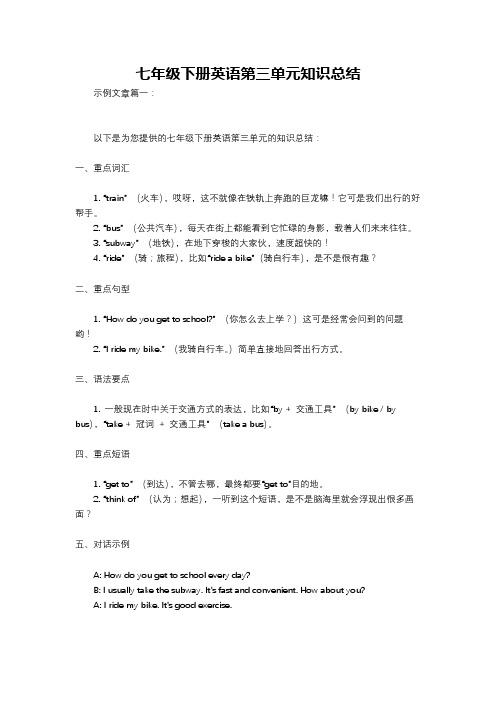
七年级下册英语第三单元知识总结示例文章篇一:以下是为您提供的七年级下册英语第三单元的知识总结:一、重点词汇1. “train” (火车),哎呀,这不就像在铁轨上奔跑的巨龙嘛!它可是我们出行的好帮手。
2. “bus” (公共汽车),每天在街上都能看到它忙碌的身影,载着人们来来往往。
3. “subway” (地铁),在地下穿梭的大家伙,速度超快的!4. “ride” (骑;旅程),比如“ride a bike”(骑自行车),是不是很有趣?二、重点句型1. “How do you get to school?” (你怎么去上学?)这可是经常会问到的问题哟!2. “I ride my bike.” (我骑自行车。
)简单直接地回答出行方式。
三、语法要点1. 一般现在时中关于交通方式的表达,比如“by + 交通工具” (by bike / by bus),“take + 冠词+ 交通工具” (take a bus)。
四、重点短语1. “get to” (到达),不管去哪,最终都要“get to”目的地。
2. “think of” (认为;想起),一听到这个短语,是不是脑海里就会浮现出很多画面?五、对话示例A: How do you get to school every day?B: I usually take the subway. It's fast and convenient. How about you?A: I ride my bike. It's good exercise.六、易错点要注意区分“by”和“take”的用法,“by”后面直接加交通工具,中间没有任何冠词,而“take”后面要加“a / an / the” 。
总的来说,七年级下册英语第三单元主要围绕交通方式展开,掌握好这些重点知识,我们就能在英语的世界里更加自如地行走啦!同学们,加油!示例文章篇二:以下是为您提供的七年级下册英语第三单元的知识总结:一、重点词汇1. “train”(火车),想象一下它就像长长的巨龙在轨道上奔跑。
人教版初中英语七年级下册Unit 3 A 知识点讲解与练习

人教版初中英语七年级Unit 3 How do you go to school? A 知识点讲解与练习A 知识讲解一、交通方式的表达法1. take/ride+限定词(冠词,形容词性物主代词)+交通工具。
如:take a / the ropeway; take his / her / my car ; ride his bike2.take the/a +交通工具to...=get/go to...+ by +交通工具乘...去= get/go to... in +修饰语+car/taxion + 修饰语+bus /train/plane/subwayeg:1)他经常乘地铁上班。
He often takes the subway to work.=He often goes to work by subway.=He often goes to work on the subway.4. 动词+ to+地点名词,常用的动词有walk, run, ride, drive, fly等。
walk to ... 走着去drive to...开车去fly to... 飞往ride to...骑车去① He _____ ____ _______ ________(想骑车去)his friend’s home.② My mother often ______ _____ _____.步行去上班。
③ Mr. King______ _____ _____.跑步去上班。
注意:动词后若直接接地点副词(here, there, home,upstairs, downstairs),介词to要省略。
She______ _____ (步行回家)from work every day.二、how long, how far, how often的区别1. how long ①时间多久,主要对一段时间提问(for+一段时间,half+一段时间,three days, four weeks等)。
初中英语 人教七年级下册第三单元知识点及练习
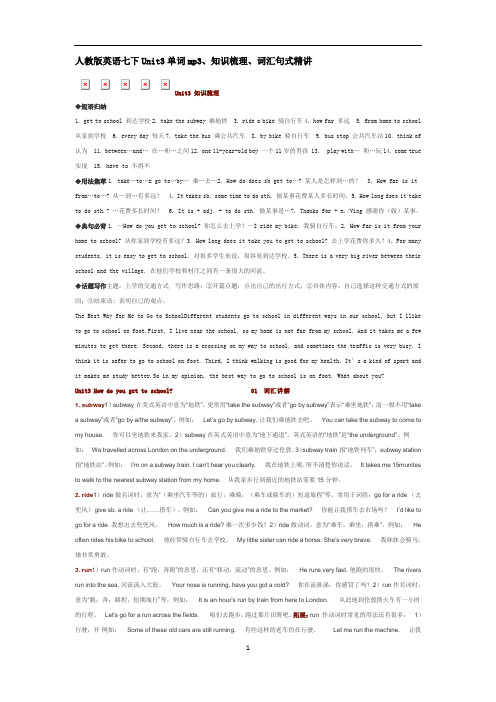
人教版英语七下Unit3单词mp3、知识梳理、词汇句式精讲Unit3 知识梳理◆短语归纳1. get to school 到达学校2. take the subway 乘地铁3. ride a bike 骑自行车4. how far 多远5. from home to school 从家到学校6. every day 每天7. take the bus 乘公共汽车8. by bike 骑自行车9. bus stop 公共汽车站10. think of 认为11. between…and… 在…和…之间12. one 11-year-old boy 一个11岁的男孩 13. play with… 和…玩14. come true 实现15. have to 不得不◆用法集萃1. take…to…= go to…by… 乘…去…2. How do/does sb get to…? 某人是怎样到…的? 3. How far is it fro m…to…? 从…到…有多远? 4. It takes sb. some time to do sth. 做某事花费某人多长时间。
5. How long does it take to do sth.? …花费多长时间? 6. It is + adj. + to do sth. 做某事是…7. Thanks for + n./Ving 感谢你(做)某事。
◆典句必背1. —How do you get to school? 你怎么去上学?—I ride my bike. 我骑自行车。
2. How far is it from your home to school? 从你家到学校有多远?3. How long does it take you to get to school? 去上学花费你多久?4. For many students, it is easy to get to school. 对很多学生来说,很容易到达学校。
七年级下册英语第3单元知识点总结

七年级下册英语第3单元知识点总结
以下是七年级下册英语第3单元的部分知识点总结:
1. 重点词汇:学会使用描述人物的形容词,例如heavy、thin、pretty、handsome等。
2. 重点句型:学会使用感叹句来表达对人物的看法,例如“What a beautiful girl she is!”
3. 语法重点:掌握形容词的用法,了解形容词在句子中的位置和作用。
4. 日常交际用语:学会在日常生活中使用描述人物的语句,例如“You look great today!”
综上所述,七年级下册英语第3单元主要涉及描述人物的词汇、句型、语法和日常交际用语。
通过本单元的学习,学生将能够更好地理解和使用英语描述人物特征和外貌。
建议学生多加练习,以提高英语口语和写作能力。
七年级下册第3单元重点知识积累(含答案)
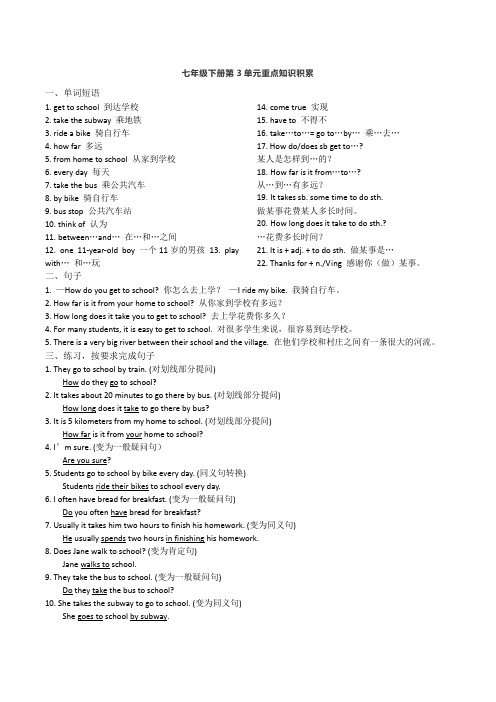
七年级下册第3单元重点知识积累一、单词短语1. get to school 到达学校2. take the subway 乘地铁3. ride a bike 骑自行车4. how far 多远5. from home to school 从家到学校6. every day 每天7. take the bus 乘公共汽车8. by bike 骑自行车9. bus stop 公共汽车站10. think of 认为11. between…and…在…和…之间12. one 11-year-old boy 一个11岁的男孩13. play with…和…玩14. come true 实现15. have to 不得不16. take…to…= go to…by…乘…去…17. How do/does sb get to…?某人是怎样到…的?18.How far is it from…to…?从…到…有多远?19.It takes sb. some time to do sth.做某事花费某人多长时间。
20.How long does it take to do sth.?…花费多长时间?21. It is + adj. + to do sth. 做某事是…22. Thanks for + n./Ving 感谢你(做)某事。
二、句子1. —How do you get to school? 你怎么去上学?—I ride my bike. 我骑自行车。
2. How far is it from your home to school? 从你家到学校有多远?3. How long does it take you to get to school? 去上学花费你多久?4. For many students, it is easy to get to school. 对很多学生来说,很容易到达学校。
5. There is a very big river between their school and the village. 在他们学校和村庄之间有一条很大的河流。
- 1、下载文档前请自行甄别文档内容的完整性,平台不提供额外的编辑、内容补充、找答案等附加服务。
- 2、"仅部分预览"的文档,不可在线预览部分如存在完整性等问题,可反馈申请退款(可完整预览的文档不适用该条件!)。
- 3、如文档侵犯您的权益,请联系客服反馈,我们会尽快为您处理(人工客服工作时间:9:00-18:30)。
Unit 3 Why do you like koala bears?一、词组1.want to do sth .想要做某事2.want sb to do sth 想要某人做某事4.Let sb do sth 让某人做某事5.kind of 稍微,有一点6.a kind of 一种…7.…years old …年龄如:ten years old 十岁8. like doing sth喜欢做某事9.play with …与...一起玩10.be quiet 安静11.during the day 在白天12.at night 在夜间13.have a look at.. 看...14.one…the other 一个...另一个...15.eat grass 吃草16.eat leaves 吃树叶17.very shy/ smart/ cute 非常害羞,聪明,可爱18.South Africa南非19.other animals其他动物二、日常交际用语(1)-Let’s see the lions frist.咱们先看看狮子吧。
(Let’s do…first.咱们先做……。
其中Let’s是let us 的缩写形式,意思是“让我们、咱们……”,一般用来提出建议,后接动词原形。
其中first是副词,意为“首先”表示顺序,其位置可置于句尾,也可置于句首。
)Eg:-Let us play games,shall we? –Great!(2)-Do you like giraffes?你喜欢长颈鹿吗?Yes,I do.是的,我喜欢。
/ No,I don’t.不,我不喜欢。
(Do you like+n.?你喜欢……吗?其中名词可为不可数,也可为可数,当是可数名词时要用它的复数形式。
)(3)-Why do you want to see the lions?你为什么想去看狮子呢?-Becase they are very cute.因为他们逗人喜爱。
-Why do you like pandas?你为什么喜欢……?-Because they’re very cure.Why是疑问副词,意思是“为什么”。
Because是连词,意思是“因为,由于”,用来叙述理由,(4)、-Where are lions from?狮子来自哪里?-Lions are from South Africa.它们来自南非。
(5)-What other animals do you like? 你还喜欢其他什么动物?_I like dogs.too.我还喜欢狗。
其他:-What animals do you like?-I like elephants.(What other animals 表示“其他什么动物”。
other 为形容词,意思是“其他的,另外的”。
other+ 名词的复数.表示没有特定的数量范围,the other+名词的复数,表示有特定的数量范围。
)三. 重点难点释义1、kind of 有点,稍微--Koala bears are kind of shy. 考拉有点害羞。
kind 还有“种类”的意思如:一种a kind of各种各样的all kinds of 不同种类的different kinds of --We have all kinds of beautiful flowers in our school.2、China n.中国Africa n.非洲China 和Africa都是专有名词,首字母都应该大写,而且和介词in连用。
--There are many kinds of tigers in China.--There are many kinds of scary animals in Africa.3、friendly adj.友好的,和蔼可亲的它是名词friend的形容词形式,同义词kind,常常和be动词连用, be friendly。
--The people in Chengdu are very friendly.4、with prep.跟,同,和…在一起--I usually play chess with my father.(注意区别与and的用法,and通常用于连接主语或宾语,连接主语时,如果有I, I通常放在and 之后,如:My father and I usually play chess together.)Play with “和…一起玩耍”“玩…”--I often play with my pet dog.--Don’t play with wa ter!6、leaf n.叶子复数形式为:leaves, 类似的变化有:knife—knives 7、hour n.小时;点钟hour前边通常加上冠词an 表示“一个小时”,即:an hour。
There are 24 hours in a day and 60minutes in an hour.9、meat n.(食用的)肉,为不可数名词,表示“许多”时,使用much来修饰,即:much meat--He eats much meat every day.10、grass n.草,为不可数名词,表示“许多”时,使用much来修饰,即:much grass。
--There is much grass on the playground.四.语法知识特殊疑问句通常以“what”、“who”、“which”、“when”、“where”、“how”、“how old”、“how many”等开头,对某一具体问题进行提问。
特殊疑问句的基本构成有两种情况:1. 疑问词+一般疑问句结构。
这是最常见的情况。
--What’s your grandfather’s telephone number?你爷爷的电话号码是多少?--Who is that boy with big eyes?--Which season do you like best?--When is he going to play the piano?--Where does he live?他住在哪儿?--How are you?你好吗?--How old are you?你多大了?--How many brothers and sisters do you have?你有几个兄弟姐妹?2. 疑问词+陈述句结构。
这时疑问词作主语或修饰主语。
例如:--Who is on duty today?今天谁值日?3. What/How about+名词/代词+其他?也是特殊疑问句,它是一种省略结构。
--I like English. What/How about you?--What about playing basketball?打篮球怎么样?根据首字母,填出正确的单词。
Unit3基础练习题A1. Don’t s_____ in class. Keep quiet, please.3. A dolphin is very i________ because it can act as people do.4. It has an u_____ face. We are afraid of it.5. The panda is very shy, so please be very q______.B) 用所给单词的正确形式填空。
1. Our teacher is very _________ ( friend) to us. We like her very much.4. The _________ ( leaf ) of the trees are yellow.5. There are many ____ ( kind ) of animals in the zoo.三、单项选择。
1. I like pandas _______ they are beautiful.A. soB. andC. because2.I am afraid _________ tigers because they are scary.A. withB. ofC. for4. Mr Li is kind _________ us. But sometimes he is kind _______ serious.A. to , ofB. with, toC. of , to5. My sister is very quiet. She has ________words.A. a littleB. a fewC. littleD. few7.I like my teacher because he can talk ____ us ___ our friend.A. to , likeB. with , likesC. to, likes8.I don’t like lions because they’re _________.A. strongB. shyC. unfriendly9.Most children like koala bears because they are ___.A.interestingB. scaryC. cuteD. both A and C 11. My little cat sleeps _______the day , but ________night he begins to work.A. at , atB. on, inC. on, atD.during, at13. I have two books. One is for you, _ is for her.A. anotherB. otherC. the other15. There is ________ elephant in the zoo. _______ elephant is from Africa.A. a , TheB. an , TheC. / , An四、句型转换。
1.I like elephants because they are interesting.(就划线部分提问)________ do you ________ elephants?2. He usually gets up and eats leaves at night.(就划线部分提问)________ does he usually _______ at night?3. He likes koalas very much. (改一般疑问句)4. They are from China. (划线提问)5My mother often works 8 hours every day.划线提问) 6.He sleeps during the day.(改否定句)根据首字母补全单词There is a zoo near my house . I like to go there and see them . In the zoo we can see many a_____1____.Look ! There is a k____2____in the tree . He’s eating leaves .Isn’t he cute ? Under the tree , there is a g___3___. Her neck(脖子) is so long . She’s a c___4___ girl . Where’s the p___5____? She’s there eating the bamboo(竹子) . She’s k___6___of shy . But the e___7___is interesting . He’s playing with kids with his long nose (鼻子) . They are v___8___fun .Look! in the pool(池塘) , there are two d____9___. They are f____10_____to people . They are playing with their balls . How happy they are !Unit3基础练习题BⅠ. 根据句意和首字母完成下列单词。
